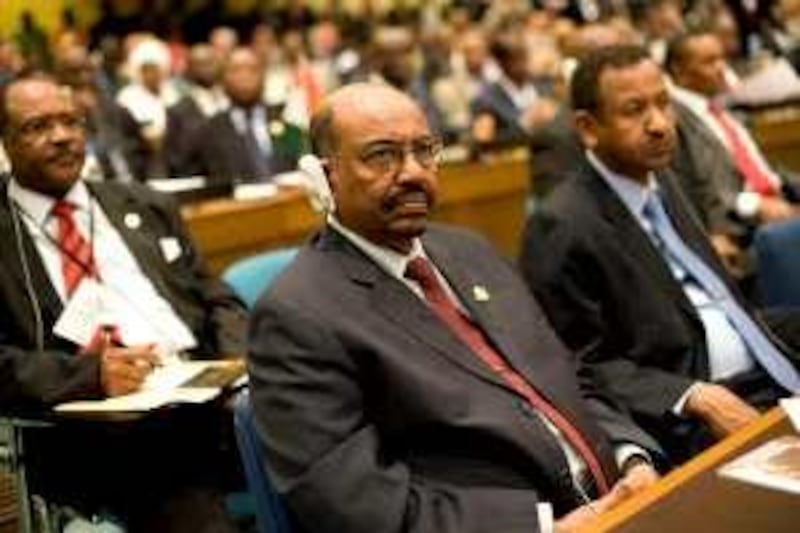NAIROBI // Southern Sudan has been mostly peaceful for five years. But since the signing of the Comprehensive Peace Agreement in 2005 that ended one of Africa's longest and most devastating civil wars, the region has remained tense.
Sudan could easily backslide into full-blown war if the international community does not step in to save the peace agreement, according to a report from a consortium of aid organisations. The next 12 months are critical. In April, Sudan will stage its first presidential election in more than 20 years. Elections in Africa often take place in the shadow of potential violence, and Sudan's will be hotly contested, coming after a 22-year civil war fought between the Muslim north and the Christian south.
On Saturday, Sudan announced a field of 10 candidates for president including the incumbent, Omar al Bashir, who has been indicted for war crimes stemming from the conflict in Sudan's western Darfur region. Other candidates include Sadiq al Mahdi, the prime minister whom Mr Bashir ousted in a 1989 coup, and Yasser Arman, a former southern rebel. As part of the peace deal the south will have a chance to vote in a referendum on self-determination. That vote will come nine months after the presidential poll in January next year. The referendum could also be a flashpoint for violence because the poorly defined border region between the north and south is saturated with oil.
"If the referendum does not take place, there will be a bloodbath," said Richard Poole, the International Rescue Committee director for South Sudan. "The situation is so delicate it can tip either way." Ten aid agencies including the reserve committee and Oxfam published a report last month calling on the international community to help Sudan through the next year both diplomatically and with development assistance.
"Sustained diplomatic engagement from the international community, including Sudan's neighbours, is what's needed," said Paul Valentin, director of Christian Aid. "A return to war is by no means inevitable, but it depends whether the world heeds the warning signs of the past year and has the political will to save the peace." As the report was released, 140 people were killed in tribal clashes in a remote region of southern Sudan, United Nations officials said. Armed Nuer tribesmen attacked Dinka cattle herders and seized 5,000 animals, the Reuters news agency reported. At least 90 people were wounded in the violence.
Clashes like this have become more frequent in the past year as the country conducted a census and voter registration drive before the election. The aid organisation report, Rescuing the Peace in Southern Sudan, said 2,500 people were killed in fighting in southern Sudan last year, more than in the Darfur region in that period. A further 350,000 have fled their homes, causing a humanitarian disaster.
"After five years of peace, southern Sudan remains one of the poorest regions on earth," said Francisco Roque, Save the Children's director for South Sudan. "People hoped the peace would bring economic benefits and development, but this has happened far too slowly and in some areas not at all. We are very worried about children who seem to be increasingly targeted in attacks." At a launch of the report in Nairobi, Mr Poole said he is optimistic that the referendum will take place and that South Sudan will vote to become the world's newest nation. However, greater questions remain such as the sharing of oil revenue, demarcation of the border and the integration of the two country's armed forces, he said.
Media reports have suggested the north is arming militia groups in the south in the run-up to the election. But Mr Poole said this is not the case on the ground. "There is no evidence that the north is supplying arms to destabilise the south," he said. The United States, one of the sponsors of the 2005 peace deal, said it is paying close attention to the situation and pledged support for Sudan through a potentially volatile year.
"It is clear that 2010 will be a critical year in securing a peaceful future for Sudan," Scott Gration, the US president Barack Obama's special envoy to Sudan, said. "Make no mistake, failure to make progress and a continuation of the unacceptable status quo by any party will be met by credible pressures from the United States and our partners in the international community." The British government said it would give humanitarian agencies in Sudan US$86 million (Dh316m) before the elections. Aid organisations are already setting aside emergency funds in case the peace process in Sudan dissolves.
"It is not too late to avert disaster, but the next 12 months are a crossroads for Africa's largest country," said Maya Mailer, an Oxfam official and co-author of the report. "Last year saw a surge in violence in southern Sudan. This could escalate even further and become one of the biggest emergencies in Africa in 2010." mbrown@thenational.ae





